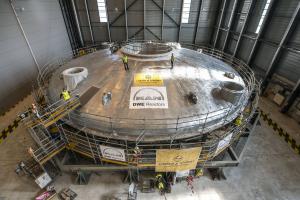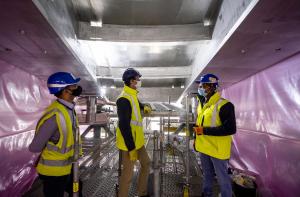Last checks before wrapping
On 10 December 2015, a convoy transporting three large steel pieces passed the gates of the ITER installation. Shaped like so many slices of pie, the 50-tonne, 60-degree "segments" were the first elements of the ITER cryostat, the largest and most complex stainless steel high-vacuum chamber ever designed. Over the years that followed, a total of 54 major segments were delivered and progressively assembled to form the four sections of the giant steel cylinder: the base, lower cylinder, upper cylinder and top lid. The base and lower cylinder are now in place inside the Tokamak assembly pit, the upper cylinder is safely stored in its protective cocoon, and the top lid, now finalized, is being prepared for a long hibernation. Because it seals the cryostat, the 665-tonne circular structure will be the last machine component to be lowered into the assembly pit.
Of the four sections that make up the ITER cryostat, the top lid is the thickest, second heaviest and most structurally complex. Contrary to the base and lower and upper cylinders, the top lid has a 3D profile, meaning that it is curved in three directions, a bit like a skull cap. "As a consequence, the alignment of the 12 segments, although partially tested in India before shipment, was a very delicate operation here in the Cryostat Workshop," says ITER cryostat engineer Girish Kumar Gupta.
Just like the upper cylinder, finalized in the spring of 2019 and placed in a sealed cocoon outside the Cryostat Workshop, the top lid will also be "mothballed" for protection. This time however, the shape of the component permits a different solution—as efficient but simpler, cheaper and more environmentally friendly. The cryostat top lid will be tightly wrapped in a sheet of material called VCI (volatile corrosion inhibitor) that ensures the long-term protection against humidity and other types of hazards. This solution was already employed for poloidal field coil #2, which was placed into storage in January.
When the last of the cryostat sections is moved into storage in October 2022, the vast Cryostat Workshop will become available for other machine pre-assembly activities.



